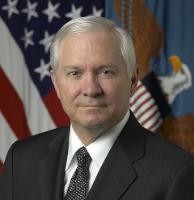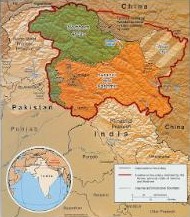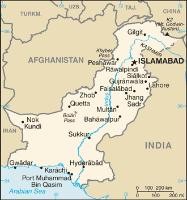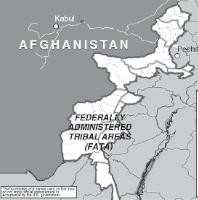Afghanistan Archive
Free Newsletter
A quick followup to my earlier post in defense of undue pessimism. According to the common wisdom, it’s churlish to deny that the Surge in Iraq was successful. And I suppose it was successful if “the Surge” is used to refer to a time period rather than a tactic. But everyone who has followed the Iraq War closely knows that there was a convergence of factors that led to the improved security situation. The increased troop presence and changed tactics associated with the Surge were a prominent one, but it’s impossible to know for sure whether they were determinant. Even […]
This, from Peter Cassatta writing about the application of a troop surge to Afghanistan at the New Atlanticist, resonated quite a bit with yours truly: However, the Iraq surge should at least have taught us that condemninga strategy before it is underway can be unduly pessimistic. That’s the closing caveat to a balanced piece examining how the tactic will be applied, its chances for success, and the obstacles it faces. I’m not sure I’m willing to renounce undue pessimism. It serves the valuable purpose of forcing people to develop strong arguments. But I’m not only open to the possibility that […]
Now that the idea of sending more troops to Afghanistan has begun to take hold as an emerging consensus, the number has begun to rise. What began as 20,000 has now become a “window of overall increase” between 20 and 30K, according to JCS Chairman Adm. Mike Mullen in a weekend press conference (via Army Times). Add in support troops and we’ll probably end up at the 40K number that a plugged in contact confided had been circulating around Washington as far back as a month ago. (Remember that the Surge was initially proposed as a 20K troop increase, but […]

To discuss human rights in Central Asia without resorting to stereotype is a difficult prospect. The area’s strategic value is unquestioned. Energy rich, at the nexus of Russia, China, Iran, and Pakistan, quite literally the heartland of the continent, Central Asia remains vitally important to every great power on the planet. That very importance has led some to turn the region’s human rights record into a vehicle for promoting their own interests — distorting reality in the process. While it would be impossible for any Western country to approach Central Asia without taking heed of its many human rights issues, […]
According to Jean-Dominique Merchet at the Secret Défense blog, France is likely to send several hundred additional troops to Afghanistan. While the actual increase is modest, the reasoning behind it has wider implications and aims to shore up one of the weak links in the NATO effort there: chain of command. If Merchet’s information is correct, and he’s pretty plugged in, the additional troops will allow the French forces in Afghanistan to regroup into a unified brigade in the east of the country where they are already deployed. French forces now stationed in Kabul would also be integrated into the […]

Earlier this month, the Pentagon issued a directive (.pdf) raising “irregular warfare” (IW) to the same level of importance as conventional battles. The December 2008 directive defines IW as operations to fight terrorists and insurgents, enhance the defense capacity of foreign governments, and promote stability in conflict-prone regions. It asserts that it is now Department of Defense policy “to recognize that IW is as strategically important as traditional warfare.” Although the U.S. armed forces have long performed these tasks, most recently in Afghanistan and Iraq, the military has often done so only with great reluctance. The Pentagon developed considerable expertise […]
It looks like when it comes to extending the Afghanistan War into Pakistan, the Taliban have beaten us to the punch. The problem of safe havens has now metastasized into a problem of securing supply lines. Of course, that’s when military planners start getting nervous. Here’s hoping the Obama administration balances what’s right and what’s necessary with what’s possible.
Last week in her regular WPR column, World Citizen, Frida Ghitis presciently called attention to the threat that Pakistani-based terrorist networks pose to Europe. Today, police in Brussels arrested what is being reported as an al-Qaida linked terrorist cell after one of the fourteen people under surveillance, who had arrived last week from either Pakistan or Afghanistan, recorded a last testament video and bid farewell to his family. The arrests come on the eve of an EU heads of state summit, and although the police are unsure whether the summit was targeted, the risk it posed led them to accelerate […]
I’ve written before about the macroeconomics of a counterinsurgency-based security posture, and specifically how COIN resembles a transfer of wealth, as compared to WWII, a.k.a. the “public works program” that ultimately got us out of the Great Depression. Andrew Exum of Abu Muqawama obliquely makes a similar point in a post titled “When Guns = Butter”: This is a genuine conundrum.Does one, in an effort to trim the budget, cancel the F/A-22 program?Or does one, in the midst of a severe recession, keep what has become afederal jobs program? In addition to trimming the budget, the justification for cutting the […]
Pakistani President Asif Ali Zardari makes a compelling case for restraint and regional cooperation in the aftermath of the Mumbai attacks in a NY Times op-ed, although I had a multi-stage reaction to the following passage, in particular: The world worked to exploit religion against the Soviet Union inAfghanistan by empowering the most fanatic extremists as an instrumentof destruction of a superpower. The strategy worked, but its legacy wasthe creation of an extremist militia with its own dynamic. What at first seemed like a disingenuous gloss on Pakistan’s instrumentalization of the Taliban on second reading seemed to put the longer […]

The commando-style terror attack in Mumbai, India, that claimed nearly 200 lives in late November highlights the ongoing danger Islamic extremists pose to even the most developed democracy in South Asia. The attack — and the diplomatic maneuvering in its wake — also casts light on the increasingly important network of relationships between India, Pakistan, Afghanistan and the United States. These four countries — three of them nuclear states — will likely decide the future of South Asia in an era of terrorism, coalition warfare and national rapprochement. The U.S.-led “war on terror,” which has seen scores of nations deploy […]

In the aftermath of the Mumbai attacks, attention has increasingly focused on Pakistan and the troubling, if opaque, links between its military intelligence apparatus and Islamic terrorist groups. But despite the very real risk of a widening of the regional war already underway in Afghanistan, the problems emanating from Pakistani soil defy military solutions. In a WPR Spotlight, we examine The Pakistan Problem. In Four Countries’ Relations Will Decide Region’s Future, David Axe examines the complicated dynamics at play between Pakistan, its two neighbors, India and Afghanistan, and the United States. In Advisers’ Views Provide Clues to Obama Approach Seth […]

In August, the Pakistani army launched a full scale military offensive in the Bajaur agency of the Federally Administered Tribal Areas (FATA). Since then, fierce clashes have resulted in the deaths of hundreds of militants and the destruction of key Taliban strongholds. This forceful demonstration of Pakistani resolve is a positive change from past efforts. However, military operations will fail if they undermine the single most important principle for victory: winning the support of the local population. And currently Pakistan is not aiding the war-ravaged Pashtun tribes of the FATA. There is no doubt that significant force is required to […]

Ten years ago, Bruce Riedel sent a memo to his boss, then-President Bill Clinton. In it, he called Pakistan the most dangerous country in the world. A ticking time bomb. Riedel’s reasons were many. Armed with nuclear weapons, Pakistan sponsored terrorists, was awash in drugs and consistently teetered on the verge of war with neighboring India, its nuclear rival. Later, he called it a “hothouse of terror.” Today, little has changed and Riedel, reportedly tapped as President-elect Barack Obama’s Pakistan adviser, continues to bristle at the problems the nation of 165 million people poses for the United States. “All of […]
Defense Sec. Bob Gates gets the last word on yesterday’s asymmetric blog war, in a Foreign Affairs essay that should put to rest any doubts about whether or not he should have stayed on at the Pentagon. The entire piece is too well-constructed to dissect, so I recommend just clicking through and reading it all. But the operative word is balance, and as a reflection of how well the piece achieves that balance, all the concerns and criticisms that I cited yesterday are represented: the need to build capacity for the wars being fought balanced by the emphasis on conventional […]
An asymmetric blogwar just broke out regarding the Army’s latest doctrinal manual on Stability Operations (see Jack Kem’s WPR feature for background). Before diving into the fray myself, here’s the sequence so far: Jason Brownlee attacks the manual as an imperialist handbook, whereby the operational doctrine facilitates and drives the strategic urge for imperialist occupations. Andrew Exum attacks Brownlee, arguing that the army would be irresponsible if it didn’t equip its junior officers and troops with the operational tools necessary to wage the wars America is actually now fighting. Any imperialist urge would come from the subsequent civilian misuse of […]
